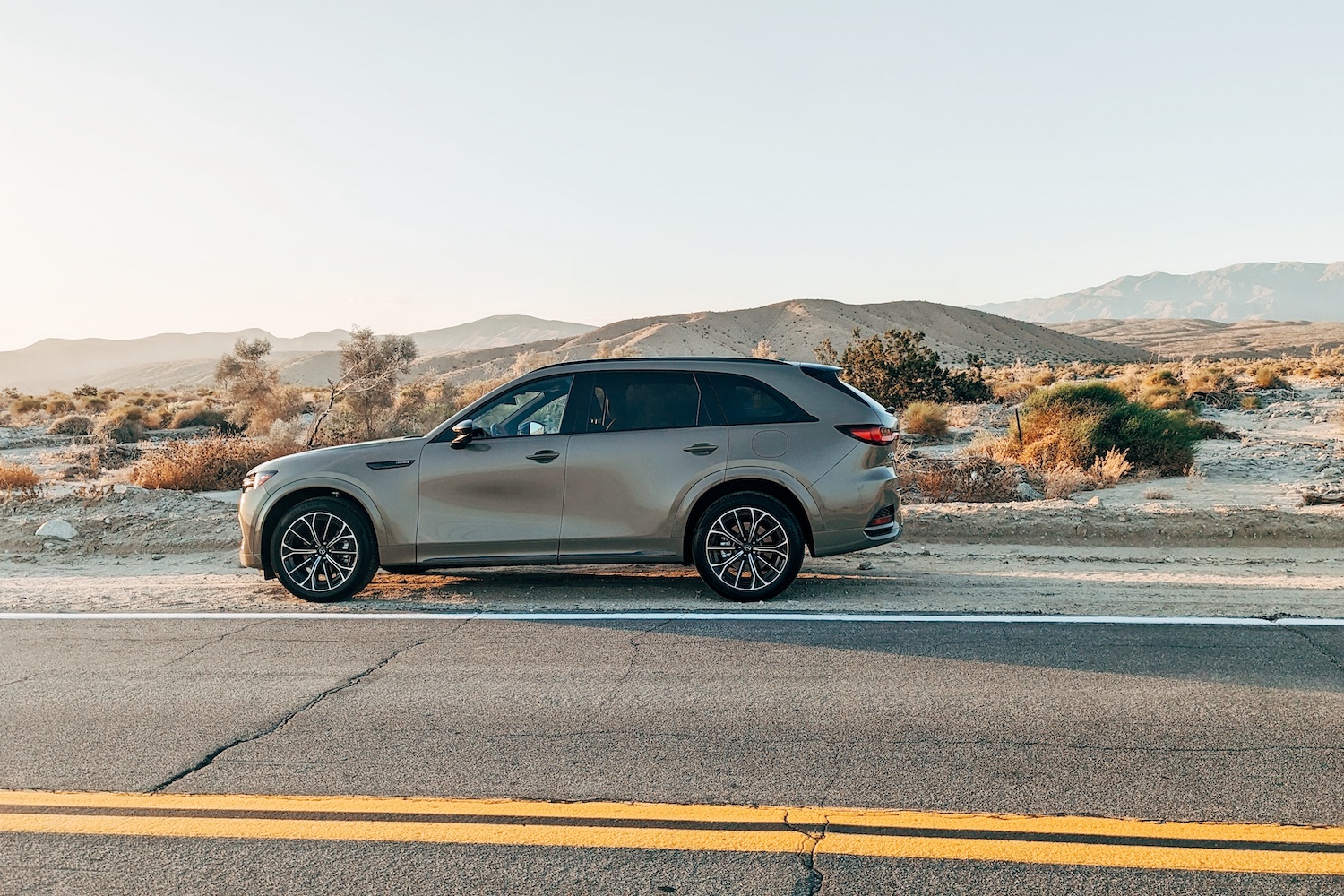Mazda’s new sportier two-row SUV proved itself perfectly suited to the Southern California lifestyle on a recent test-drive of the Turbo S Premium Plus and PHEV models around the Coachella Valley.
When Mazda unveiled its all-new CX-70 earlier this year, the midsize two-row crossover was billed as a vehicle for that offered a hefty dose of luxury, much like its year-old sibling. Designed for premium SUV buyers looking for more cargo space but who don’t necessarily need nor want three rows of seats – hobbyist empty nesters or “Dual Income No Kids” couples – although using the same platform as the CX-90 sportier styling tweaks certainly help set it apart.
Mazda
Dan Aguilar, Mazda’s vehicle line planning product manager, says the lower front bumper, blacked-out trim pieces, gloss black rear roof spoiler and 21-inch wheels add a slightly more aggressive yet still upscale edge to the CX-70’s design language. Inside the plush and spacious cabin, high-quality materials, including premium Nappa leather, suede, and metal accents, create an inviting atmosphere.
Mazda might have a long-established reputation for making driver and performance-oriented premium cars, but it’s not traditionally categorized in the same luxury bracket as brands like BMW or Mercedes-Benz, something the brand is looking to change on its strategic march upmarket while expanding its presence in the competitive midsize SUV segment.
Best in Class Cargo Space
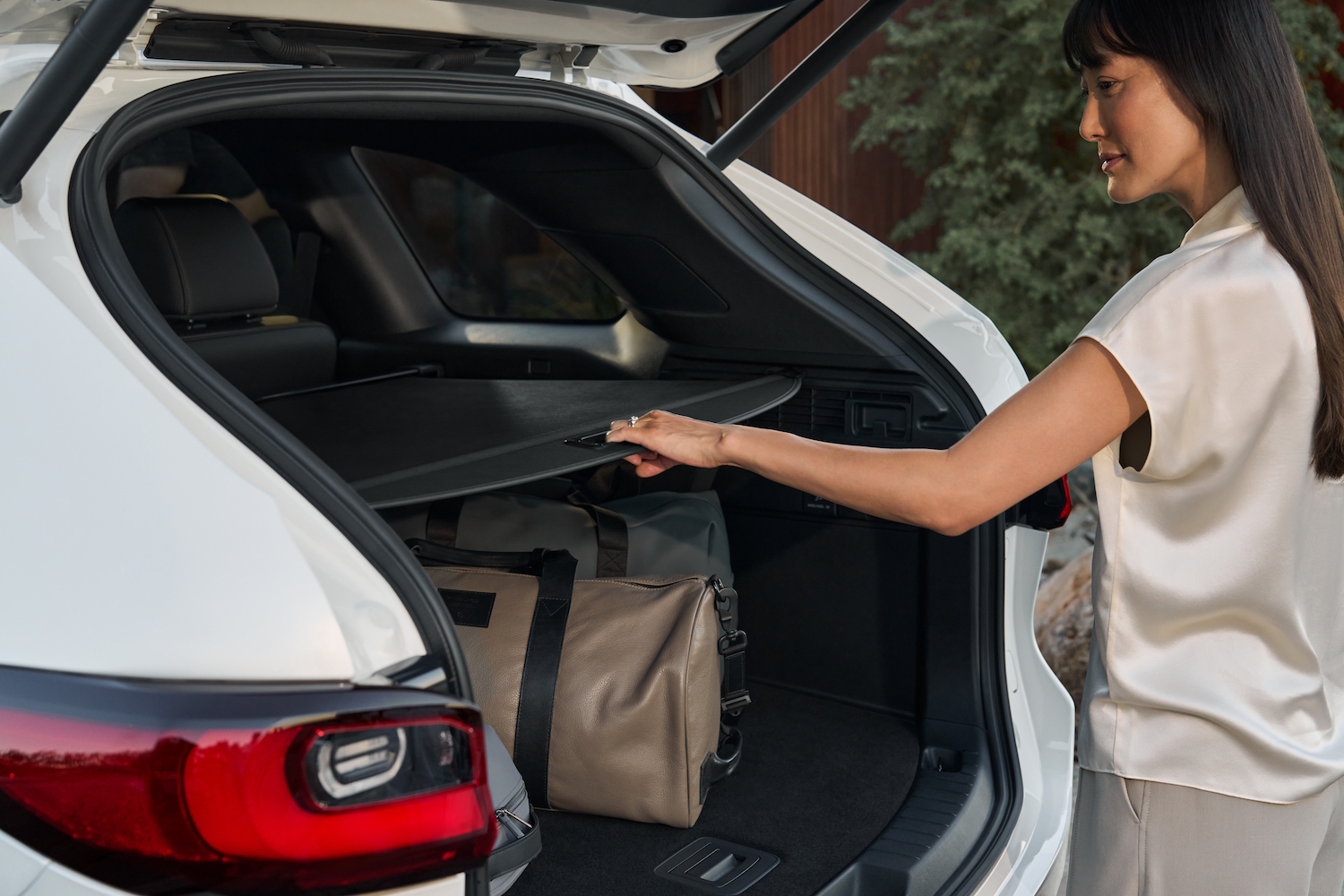
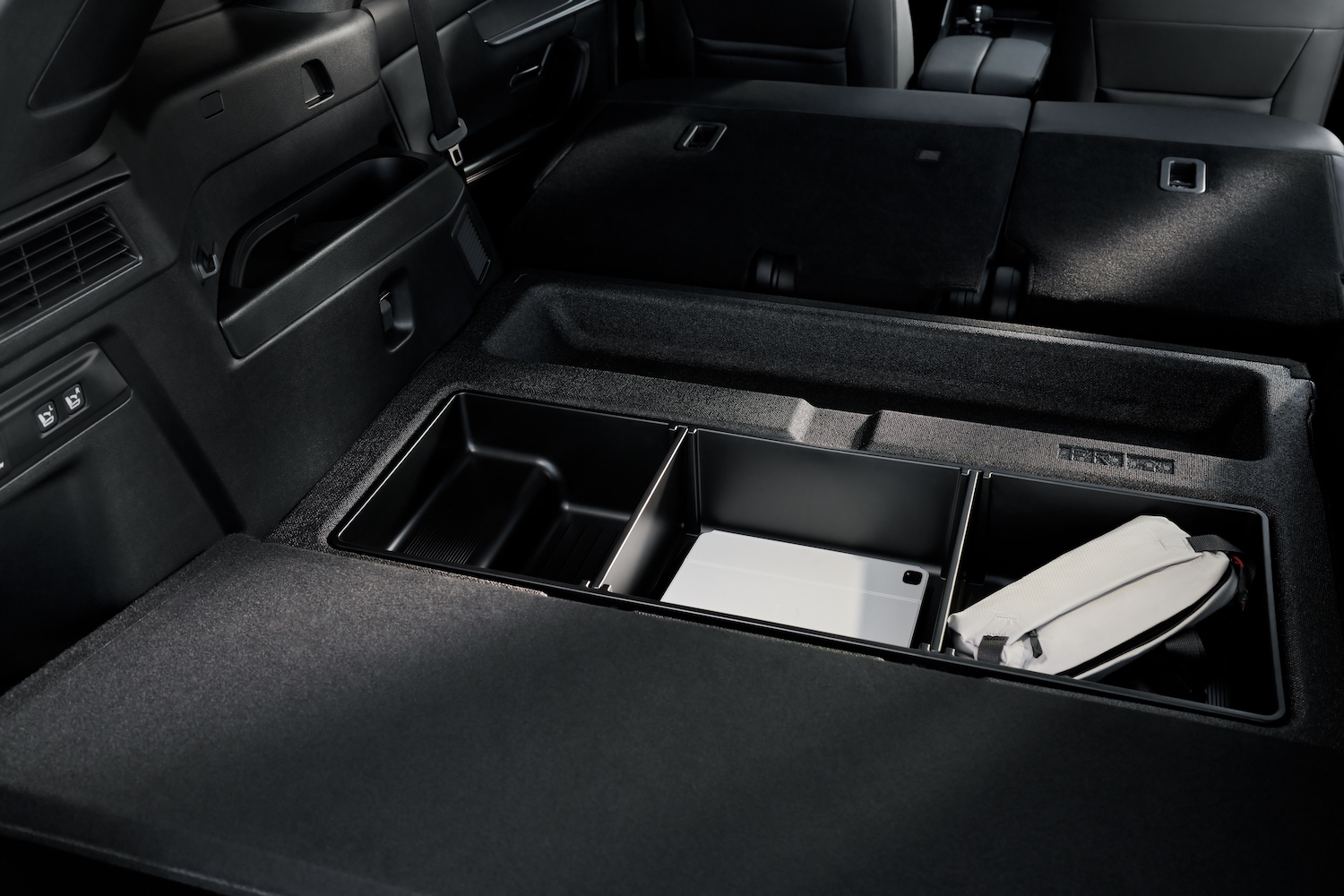
Mazda
One of the biggest selling points of the CX-70 is its cargo space (40 cubic feet with the remote-folding rear seats up and 75 cubic feet with them down), which has been optimized for storage with additional compartments, including a unique sub-trunk design to stow valuables and other small items out of sight. It’s also the first Mazda crossover to feature Alexa Built-In integration as standard for hands-free command prompts.
And for new assistance technologies, the emergency-only Unresponsive Driver Support will automatically decelerate and stop the vehicle if it detects a driver isn’t responding to escalating alerts.
To get a feel for how the latest addition to Mazda’s SUV lineup performed and how it might tempt buyers away from some of its closest competition (the Jeep Grand Cherokee 4xe, Lexus RX, and BMW X5, all of which Mazda confidently had on display for a side by side comparison during the drive event), I was invited to test the Turbo S Premium Plus and PHEV on suburban streets and mountain roads around Palm Springs.
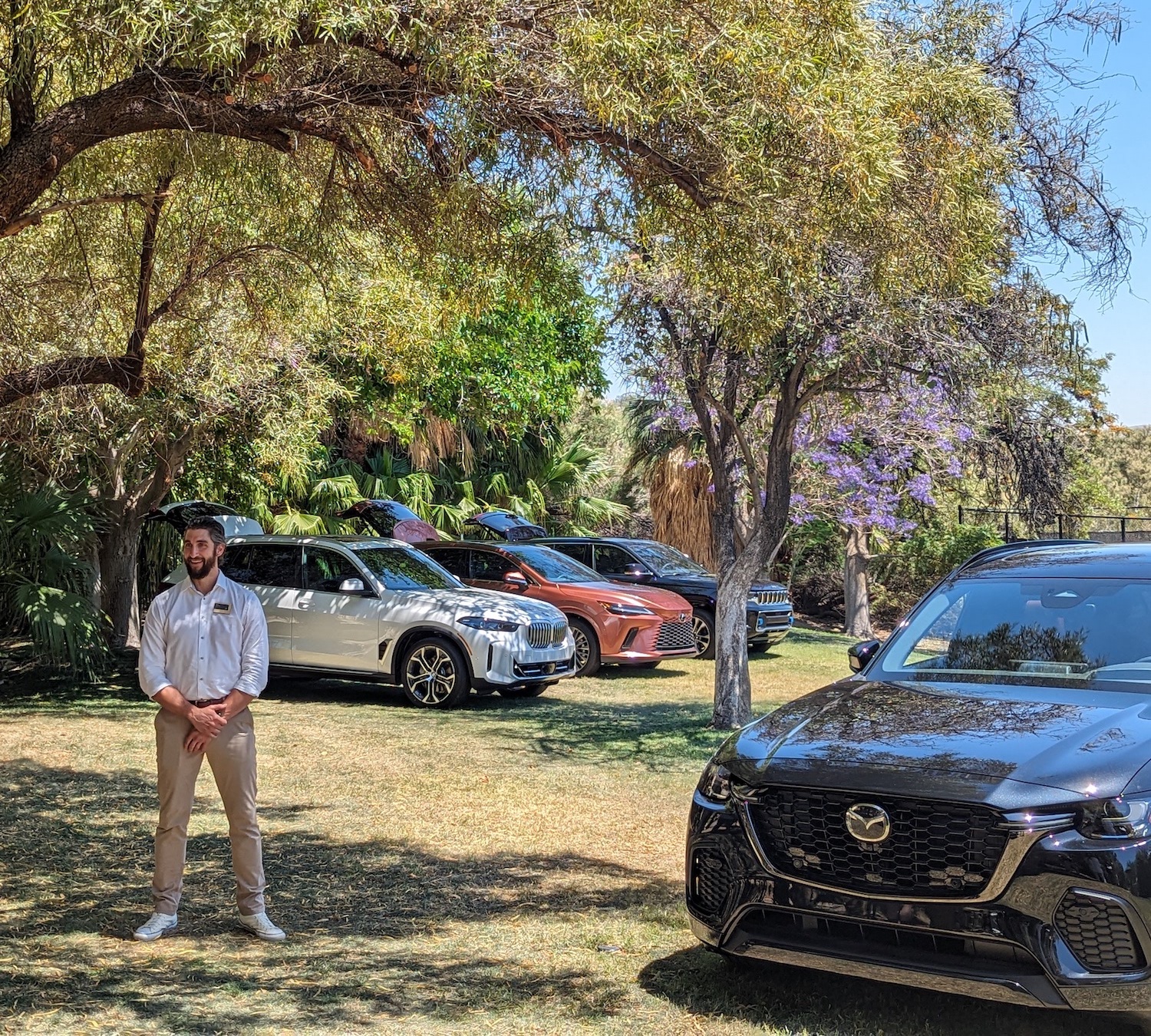
Keri Bridgwater
CX-70 3.3 Turbo S Premium Plus
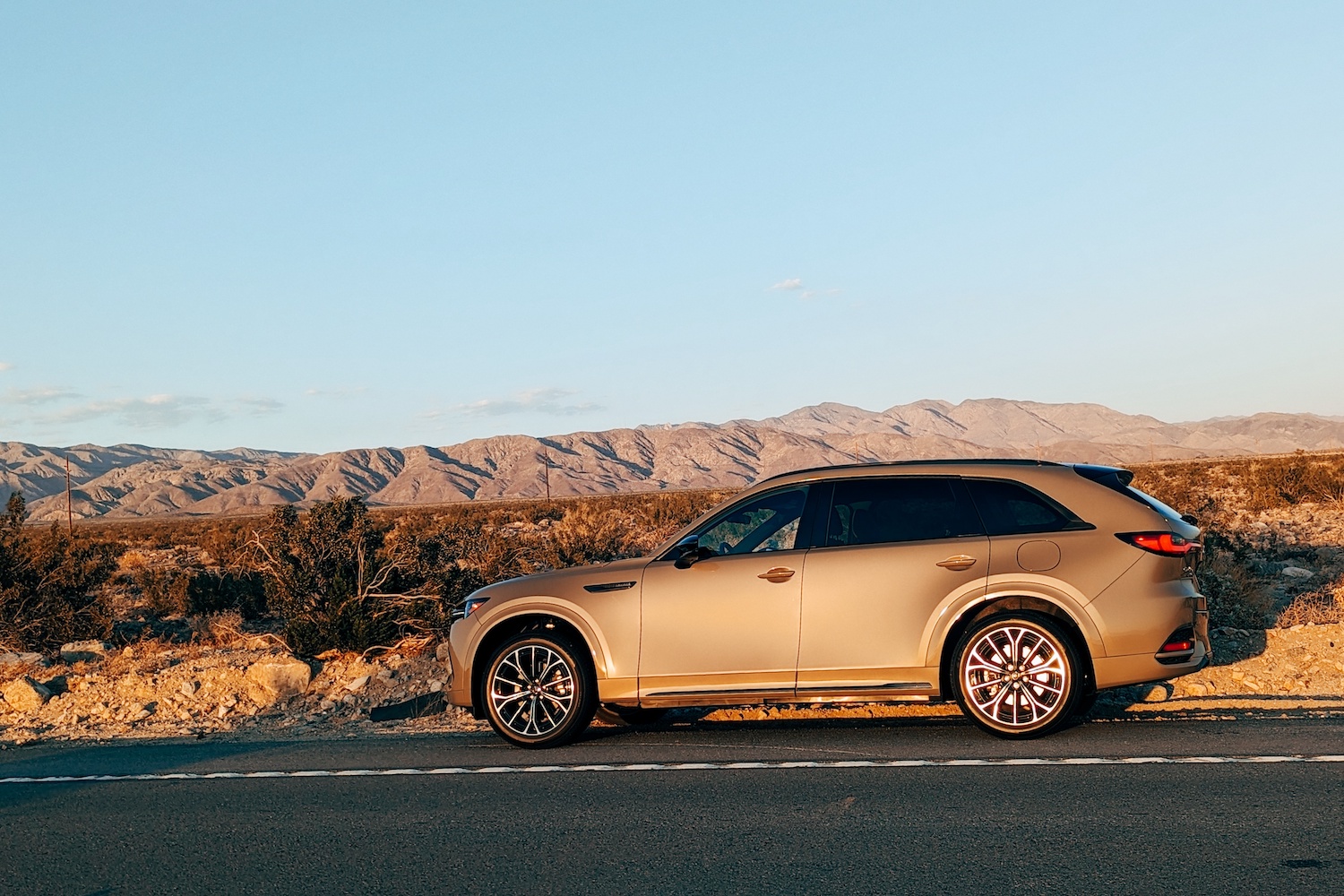
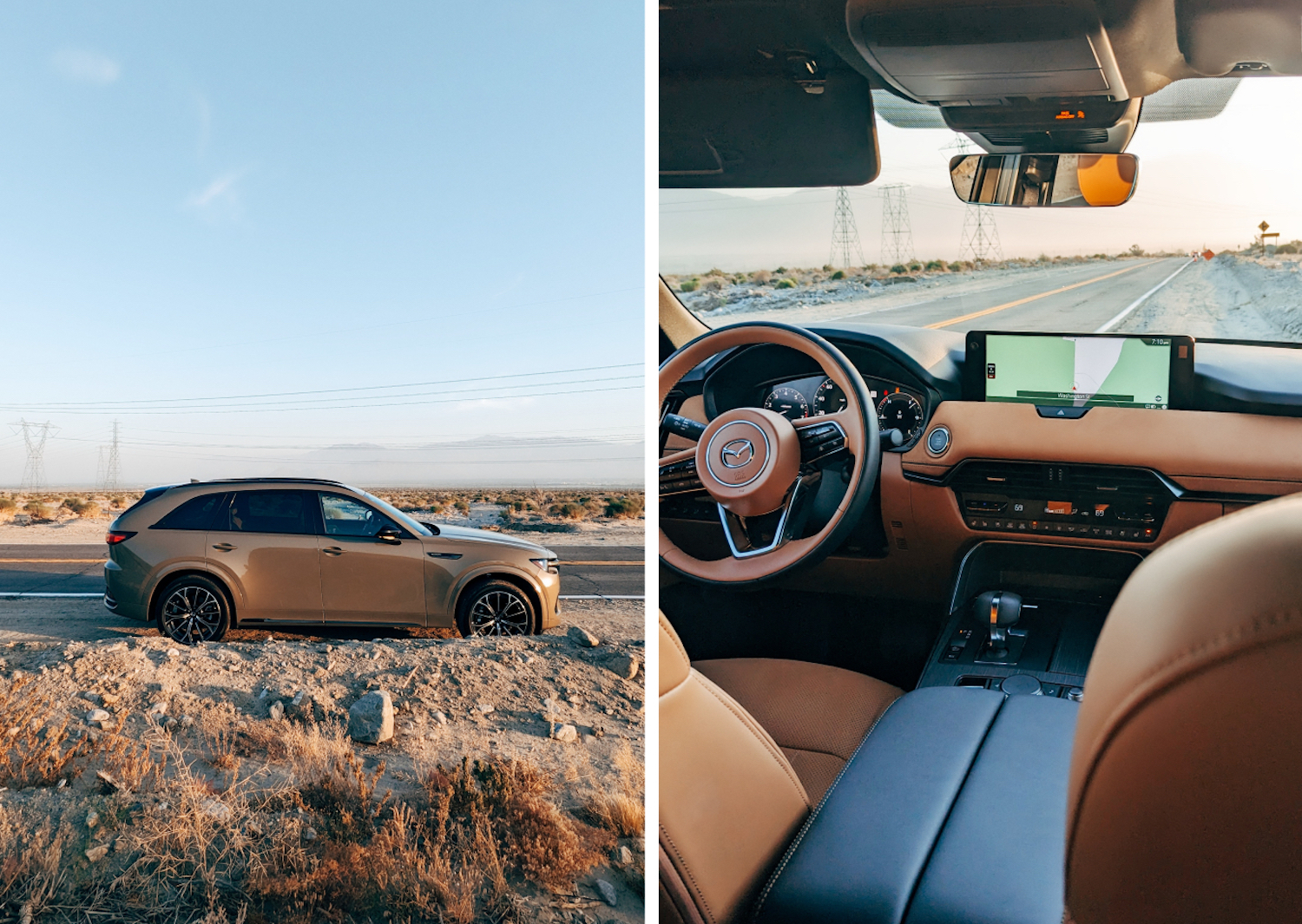
Keri Bridgwater
First up, the Turbo S Premium Plus – an Inline 6-Cylinder that puts out 340 HP and 369 lb-ft of torque backed by an 8-speed automatic transmission and standard i-Activ AWD. With late afternoon temperatures still in triple digits, the ventilated eight-way power adjustable driver seat (a Premium Plus package perk in addition to the heated front seat option, which it’s worth noting comes as standard on all trims) made my 45-minute cruise over to the Indian Wells Golf Resort a cool and comfortable affair.
A mix of surface roads and two-lane highways along the route provided ample opportunity to get acquainted first with the infotainment system, which I found intuitive and straightforward to operate using a mix of the center console-mounted navigation wheel (although I later learned not everyone was a fan) and steering wheel buttons. The drive also allowed me to check out wireless smartphone connectivity and Android Auto, which meant the 12-speaker Bose sound system got to shine while running through one of my Spotify playlists.
Compared to the CX-90 (which I drove from last year) the ride felt surprisingly stiff but the six-cylinder delivered a sure-footed and smooth sense of velvety power in all the right places. During orientation, I learned that the Turbo S version I was driving also came equipped with a Mazda tow package that rated it up to 5000 pounds and utilized a bird’s-eye camera for seamless hitch ups.
On the way back to Desert Hot Springs, I opted to skip Interstate 10 and retraced my earlier route through a winding road that cut through the Coachella Valley Preserve instead – a perfect place to play around with Mi-Drive mode selection and pop it into Sport Mode (an even stiffer ride) for a few miles before stopping to take some photos during golden hour and admire the interior whose sophisticated and classic combination of quilted Nappa leather seats and suede dashboard inserts really leaned into the au courant quiet luxury trend but will no doubt age beautifully.
And with daylight fading, although the 12.3” digital cluster was visible through the handsome leather-wrapped wheel, the head-up display made a welcome appearance as twilight began to settle over the Sonoran Desert.
CX-70 PHEV Premium Plus
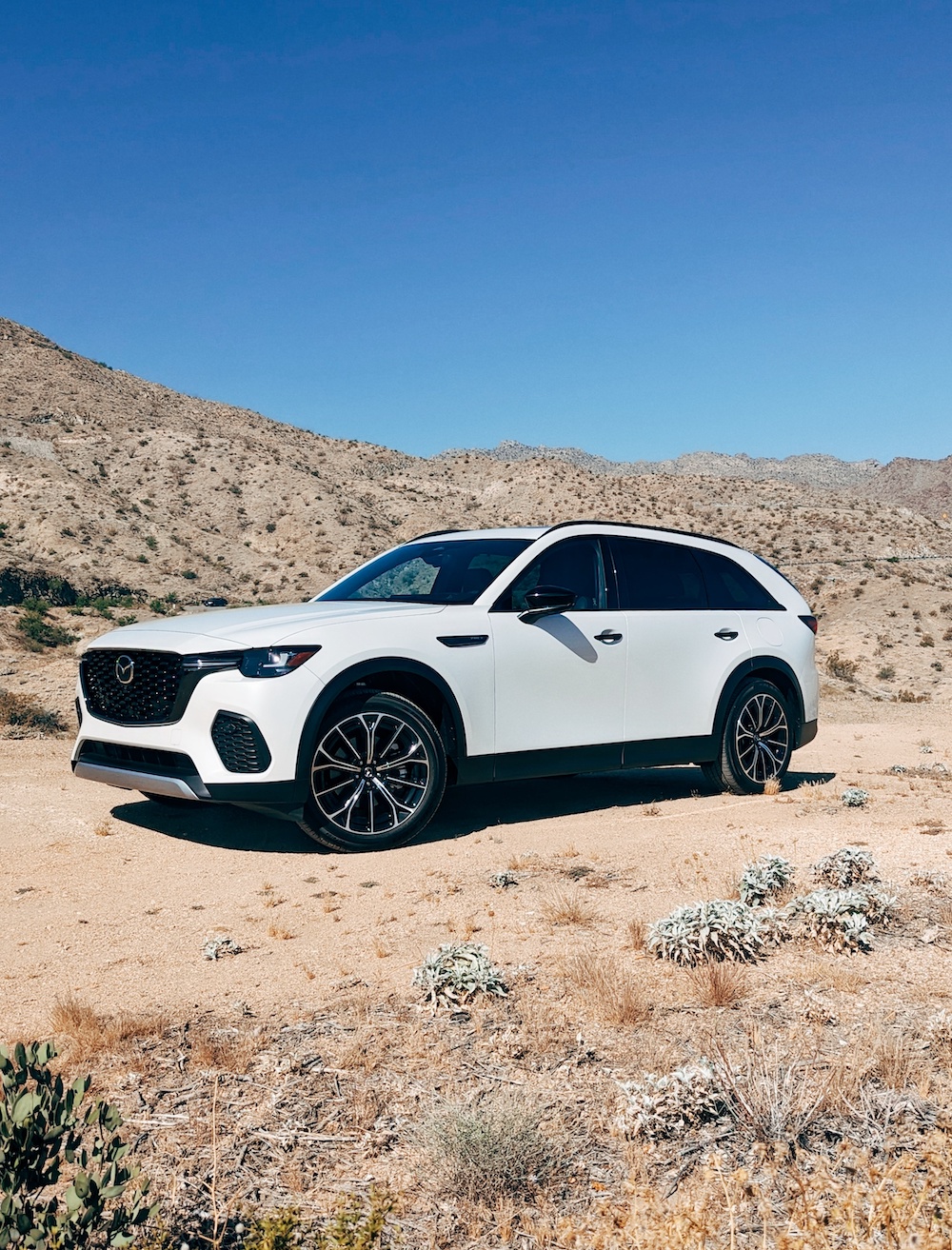
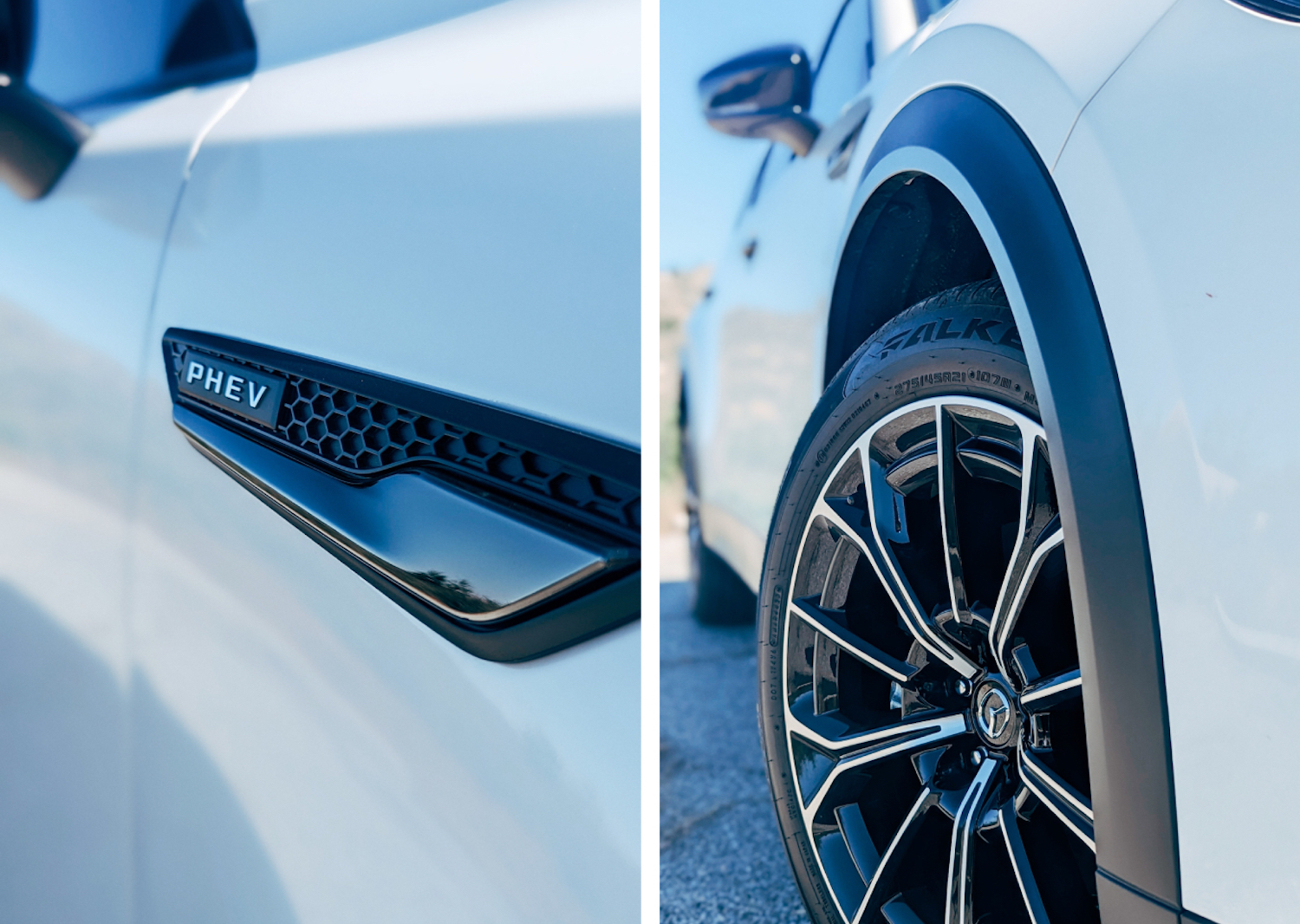
Keri Bridgwater
The following day, it was time to put the PHEV Premium Plus through its paces, carving curves along a series of switchbacks along Route 74 as it climbed into the San Jacinto Mountains and along the scenic Pines to Palms Highway with a quick stop just below the Coachella Valley Vista Point to take some more photos and have a quick go in Off-Road mode on a tiny slope – which didn’t do the setting justice whatsoever but felt fun, nonetheless.
When fully charged, Mazda says the 17.8-kWh battery pack can deliver the CX-70 PHEV a full 26 miles in EV-only mode and 25 MPG combined in hybrid mode when the battery is depleted but before I made it a mile down the road I was instantly enamored with the velvet-smooth drive – even later on when barreling through some sharp turns. The 2.5L SkyActiv 4-cylinder engine and a 68 kW electric motor can produce a total of 323 HP and 369 lb-ft of torque, while the Mazda Kinematic Posture Control suspension geometry (which works like automatice and invisible magic to keep the vehicle’s body flatter through curves) and i-Activ AWD system made light work of the mountain roads and handled turns with panache.
The eight-speed transmission again shifted beautifully, and I sailed along with both hands on the wheel in a mix of EV and Normal mode. I thought the Rhodium White Metallic exterior made a striking contrast against the desert landscape, and being in the vehicle for close to three hours’ total drive time, played around more with the seat setting and lumbar support.
Despite being identical to the Turbo S Premium Plus, I struggled to navigate the infotainment system and needed to re-load the SatNav, which I chalked up to fumbling with the navigation wheel, being unfamiliar with the buttons and needing to keep my eyes firmly on the road. Not usually a fan of lane assist (which came to life just once along Pines to Palms), I forgot to try the cruise control system after getting back on the highway. I wasn’t able to utilize the best-in-class cargo storage during the drive either, but as an avid snowboarder who likes making impromptu trips to the mountains every winter, I could see myself putting those rear seats down, throwing my board in the back and enjoying every minute of that six-hour drive from San Diego up to Mammoth in this very good looking and hugely capable SUV.
Seven Trim Models and Competitive Pricing
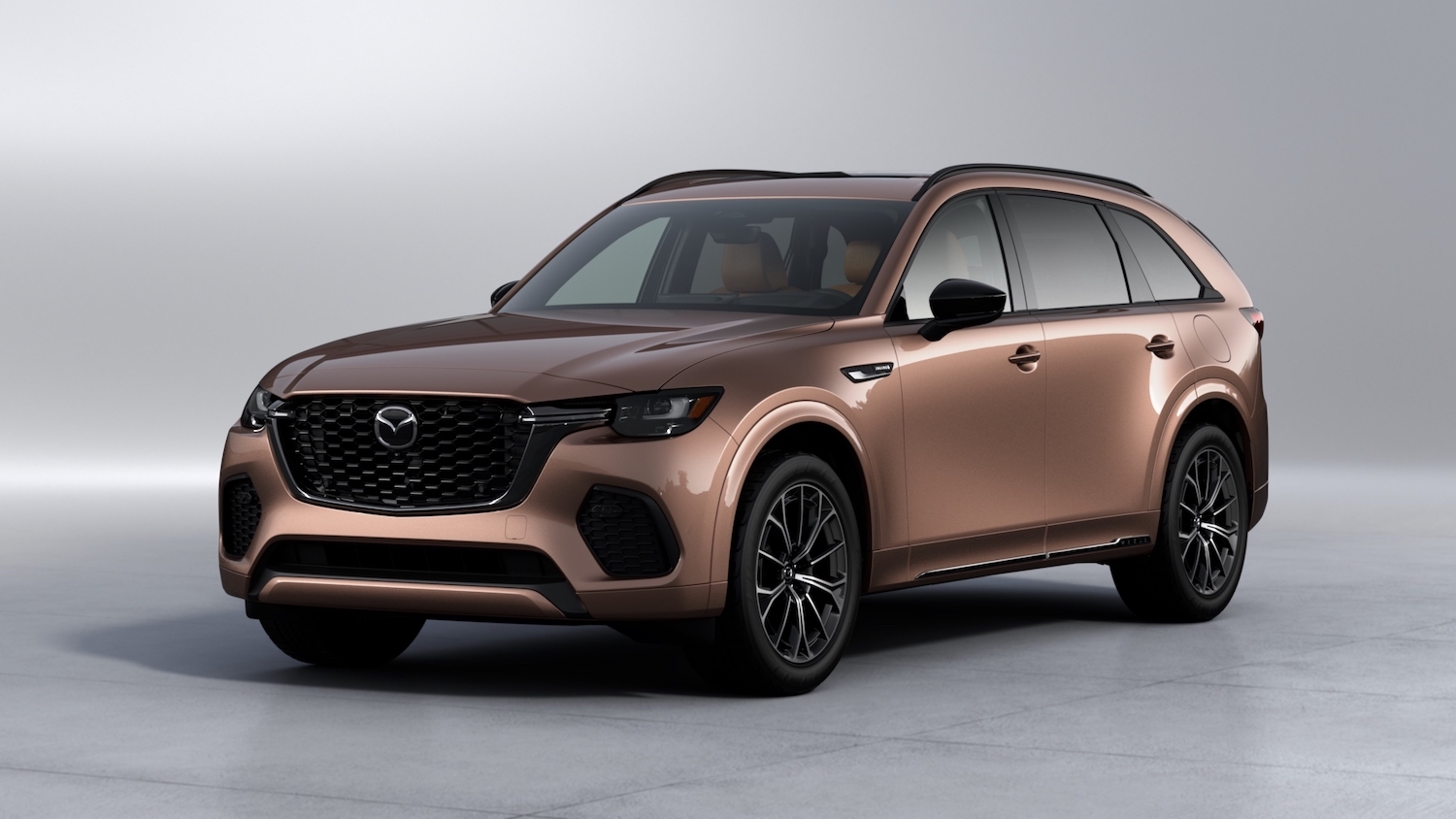
Mazda
With two powertrains and three horsepower strengths, the seven different trim models across the CX-70 lineup come in three tiers (Preferred, Premium, Premium Plus) and are available in popular Mazda exterior colors like Soul Red Crystal Metallic and Zircon Sand Metallic or the all-new Melting Copper Metallic, a rich earth tone meets vibrant orange.
For interior options, there’s the above mentioned quilted tan Nappa leather on the Turbo S Premium Plus; in contrast, the sportier red Nappa leather with red stitch detailing on the 3.3 Turbo S Premium was inspired by the 100th Anniversary Special Edition MX-5. Offered at a range of price points: the 3.3 Turbo Preferred starts at $40,445, the range-topping Turbo S Premium costs $52,450 while the fully loaded PHEV Premium Plus trim rings in at $57,450. Visit mazdausa.com for more information.

